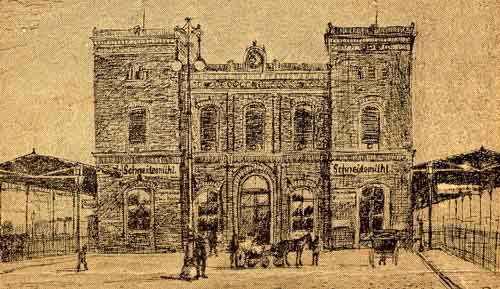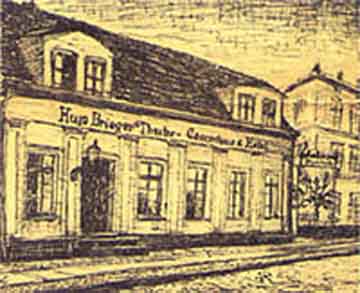.
Schneidemühl's
bygone days

An early view of the
railway station,
mid-19th century, before its enlargement.
Schneidemühl's position on the rail line Berlin - Königsberg
facilitated much commerce.
In years to come Schneidemühl became an important railway hub and
a strategic target which,
during the last phases of the Second World War, caused intense
fighting.
1900 — fin-de-siècle
Schneidemühl — the Jewish owned Brieger's elegant hotel,
theater and concert house, located on Neuer Markt 10 was one
of the oldest venues
of this type in Schneidemühl and a favorite watering hole
for Jewish and Gentile clientele alike.
During the war years of 1914-18 the hall served as emergency
hospital.
Hotel de Rome on Neuer Markt 21 was owned by Eduard Zander in the 1890s.
Although less than the
pretentious name conjures up,
this was another of
Schneidemühl’s favorite meeting places.
Facing the viewer is the old Zeughaus,
the armory, where
Posenerstrasse ended
to make a sharp turn to the
left before the street was extended in the late
1880s.
Hill’s Hotel on the right, owned by Lesser Hirsch in the 1890s,
was a popular venue for the
local military at the turn of the 19th century.
One of the many old town mills on Mühlenstrasse 22, built in 1804
in the same locale
where there used to stand a mill since days immemorial.
This house was torn
down in 1928 and, the only reminder
of Schneidemühl's
raison d'être was the name of the street — Mühlenstrasse.
Mühlenstrasse corner of Wasserstrasse, a scene
of ca. 1870 that breathes
village peace and
quiet. The house in the foreground, built of clay and timber,
used to be owned in 1896 by the city's well-known photographer Oskar Merkel.
The first automobile in Schneidemühl, ca. 1895,
aroused much excitement,
curiosity, rejection and, fear.
The proud owner was
Schneidemühl's popular
painter and photographer Theophil
Graszynski.
Back to
top
Copyright
©
2006-2019 Peter Simonstein Cullman

